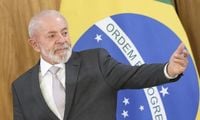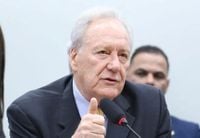The Brazilian government has firmly rejected a proposal from the Trump administration to classify two of the country's most notorious criminal organizations, Primeiro Comando da Capital (PCC) and Comando Vermelho (CV), as terrorist groups. This decision came during a high-stakes meeting on Tuesday, May 6, 2025, in Brasília, attended by Brazilian officials and a U.S. delegation led by David Gamble, the interim head of sanctions coordination at the U.S. Department of State.
During the meeting, U.S. representatives argued that designating these factions as terrorist organizations would enable the imposition of tougher sanctions under U.S. law. They asserted that such a classification would expand the reach of actions against transnational organized crime, a growing concern for U.S. authorities. Gamble noted that the FBI has identified the PCC and CV operating in at least 12 states across the United States, including New York, Florida, New Jersey, Massachusetts, Connecticut, and Tennessee.
U.S. officials claimed that members of these gangs utilize American territory to launder money, often with the assistance of Brazilians traveling to the U.S. In response, the U.S. Embassy has reportedly denied 113 visas to individuals linked to these organizations, reflecting their serious approach to the issue.
However, Brazilian officials countered that the classification of terrorism does not apply to the PCC and CV under their national legislation. They argued that, according to Brazilian law, terrorism is defined as actions motivated by ideology, politics, or religion, which does not align with the primarily economic and illicit motives driving these criminal factions.
During the discussions, Brazilian representatives emphasized ongoing efforts to combat organized crime, including the isolation of gang leaders in federal prisons and collaborative operations with state Public Prosecutors. They also highlighted diplomatic efforts to enhance cooperation with other Latin American countries in addressing organized crime.
In a related context, Senator Flávio Bolsonaro (PL-RJ) had met with Ricardo Pita from the U.S. delegation the day before the meeting, focusing on the fight against organized crime. Despite speculation regarding the visit's connection to potential sanctions against Minister Alexandre de Moraes of the Supreme Federal Court, Flávio Bolsonaro denied any links, asserting that the discussions were strictly about organized crime.
The U.S. delegation's push to classify the PCC and CV as terrorist organizations reflects a broader trend in U.S. policy under the Trump administration, which aims to frame Latin American criminal groups within a terrorism context. This approach, according to political analysts, is intended to facilitate stricter sanctions and international cooperation against these organizations.
Vitelio Brustolin, a professor of International Relations at the Federal Fluminense University and a researcher at Harvard, outlined four primary reasons for the U.S. interest in classifying these factions as terrorist organizations. First, he noted that both the PCC and CV have expanded their operations beyond Brazilian borders, forging connections with drug cartels and criminal organizations in other South American nations and the U.S., which complicates drug and arms trafficking.
Secondly, Brustolin pointed out that these factions have been linked to violent actions, including bombings and assassinations, which could be classified as terrorist acts under U.S. definitions. He emphasized that such activities not only threaten public safety but also challenge state authority.
Furthermore, Brustolin highlighted evidence of PCC infiltration in the U.S., particularly in states like Massachusetts and Pennsylvania, aimed at expanding criminal operations, laundering money, and trafficking weapons. This presence in the U.S. heightens the urgency for more stringent measures against these groups.
Lastly, Brustolin explained that recognizing the PCC and CV as terrorist organizations would facilitate the imposition of more severe economic sanctions, asset freezes, and enhance international cooperation to combat these factions effectively.
Political scientist Maurício Santoro, affiliated with the Brazilian Navy's Center for Political-Strategic Studies, echoed Brustolin's sentiments, suggesting that the Trump administration seeks to encourage Latin American governments to adopt a similar stance on organized crime.
According to Brazilian anti-terrorism law, terrorism is defined as actions motivated by xenophobia, discrimination, or prejudice that provoke widespread terror and endanger public safety. The law outlines specific acts that constitute terrorism, including the use of explosives and threats to public safety.
In contrast, U.S. law provides a broader definition, allowing for the classification of groups engaged in international drug trafficking and organized violence as terrorist organizations. This discrepancy in definitions complicates diplomatic relations and efforts to combat organized crime across borders.
As the discussions continue, the Brazilian government remains firm in its stance that the PCC and CV do not meet the criteria for terrorism as defined by its laws. The dialogue between the two nations highlights the complexities of addressing organized crime on an international scale, with differing legal frameworks and approaches to combating these pervasive threats.
The outcome of this meeting could have significant implications for future U.S.-Brazil relations and the ongoing efforts to tackle organized crime in both countries. As the world watches, the Brazilian government is poised to maintain its definition of organized crime while navigating the pressures from its northern neighbor.


